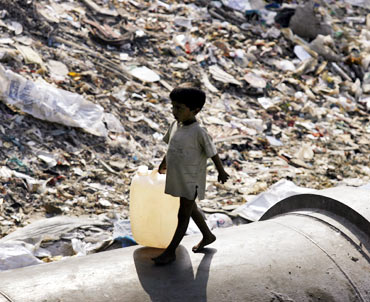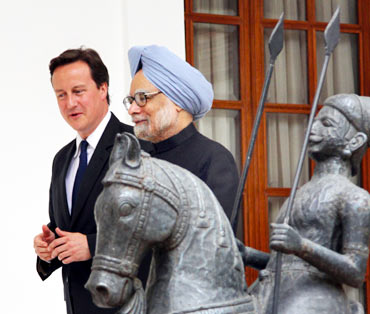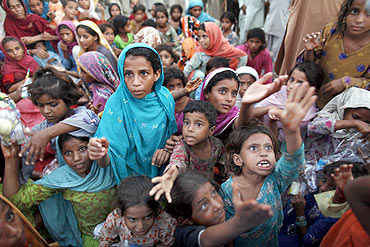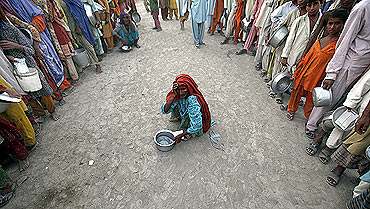Photographs: Arko Datta/Reuters
Britain plans to end or reduce overseas aid to the poor in fast-emerging nations such as India, China and Russia and redirect it towards countries like Pakistan and other conflict regions where it can make a difference.
The 7 billion pound overseas annual aid budget will be directed to areas where Britain has a clear national interest, Andrew Mitchell, Britain's minister for international development, was quoted as saying by The Times.
Mitchell called for a new emphasis on stabilising potentially failing states at the expense of "developing countries that have a stable government and a well-established rule of law".
'In India, there is a development paradox'
Image: British Prime Minister David Cameron with his Indian counterpart Manmohan SinghPhotographs: B Mathur/Reuters
"I am pushing for us, in future to spend more of the UK's aid programme in conflict and fragile countries," he said.
"Because in doing so, we will maximise our impact on the lives of the most vulnerable, while also leveraging the contribution that aid can make to national security," he said.
He added, "In India, there is a development paradox. On the one hand, there are more poor people in India than the whole of sub-Saharan Africa. On the other, India has a space programme, it is a nuclear power, it is roaring out of poverty because of economic policies. They have their own aid programme of, I think, 1 billion pounds in Afghanistan."
Britain to cut aid to China, Russia
Image: Homeless migrant men sleep under a bridge in downtown ShanghaiPhotographs: Nir Elias/Reuters
Russia and the emerging economic superpower China, which had 250 million pounds in the past five years, will also lose British aid funding.
"The coalition government has, even in very difficult economic times, underlined and reinforced Britain's development commitment to the poor world and made it crystal clear that we will not seek to balance the books on the backs of the poorest people on the planet," Mitchell said.
"The money will be redirected towards those countries where they can make the most difference," he said.
'The world's poorest people have an interest in security'
Image: Flood victims stretch their hands towards aid workers distributing gifts in Pakistan's PunjabPhotographs: Damir Sagolj/Reuters
"We have to move beyond a zero-sum game. The world's poorest people have an interest in security and development. So do we," Mitchell said.
According to him, the Third World conflicts created mass migration, crime and ungoverned space for terrorists, which directly threatened Britain and that conflict cost four times more to stop than it did to prevent.
"The coalition's analysis of development is that it is conflict first and fore-most that mires people in poverty," he said, pointing to statistics that show that 22 of 34 countries farthest from achieving the Millennium Development Goals are in the midst or emerging from conflict.
Britain will cut aid to India, give more to Pak
Image: A flood victim waits for food handouts at a relief camp in Sukkur in Pakistan's Sindh provincePhotographs: Akhtar Soomro/Reuters
"So it is important that it concentrates on those countries and regions that are at greatest risk, those that are of greatest interest to us, and those where the UK as a whole is likely to have the greatest impact."
Under the new policy, Commonwealth countries are expected to get higher levels of British overseas aid, the minister said, with an emphasis on education, particularly of women, and training and support for government bodies.
Pakistan, nuclear armed, increasingly unstable and a source of terrorist attacks on Britain, is set to become the largest recipient of British overseas aid in the coming years, he said, as a result of bilateral review of development, which is due to conclude in January.






article